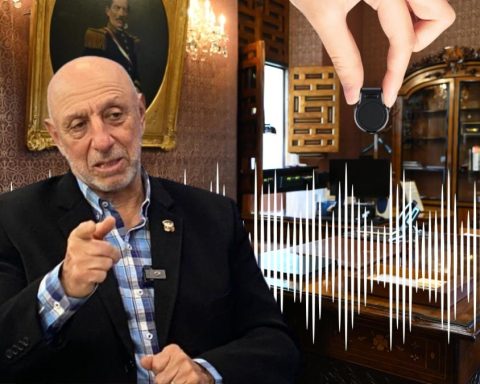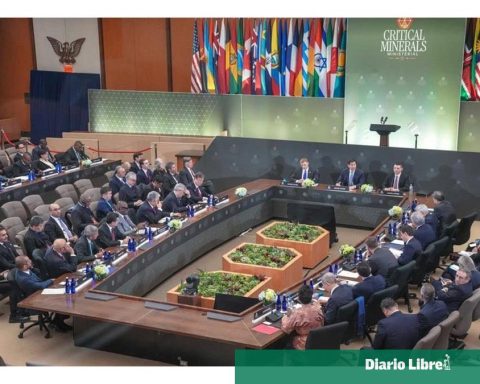It was in the National Congress, in Valparaíso, in the context of his first Public Account, that President Gabriel Boric announced that during June the tax reform bill would be presented, which is assumed in the Palace as the basis for financing the program. of reforms that they hope to carry out. And finally, after a tight pre-legislative agenda, which did not consider the opposition parties, it will be today, Friday, July 1, that the Ministry of Finance will officially present this tax reform project, which is divided – so far – into three projects, and whose main purpose is to achieve the ambitious collection of about 4.3% of the Gross Domestic Product (GDP). Although the authority has not yet specified the number of projects that will enter Congress in the context of this “great reform”, it has been anticipated that there will be at least three.
A first bill, which is considered the “heart of the reform”, and which contains measures against evasion and avoidance, exemptions and changes in matters of income tax, wealth and disintegration of the tax system, whose phase of preparation is already in its final stretch, and that will enter this Monday, July 4, to the Chamber of Deputies, through the Treasury Commission. This first proposal represents about 70% of the extra US$12 billion that this structural change in tax matters seeks to collect in the regime.
The Government made the decision that the pre-legislative work would be in the hands of the Minister of Finance, Mario Marcel, ruling out the direct intervention of the General Secretariat of the Presidency (Segpres), headed by Minister Giorgio Jackson, a situation that is at least “special” they point out observers, since pre-legislative work is precisely one of the main functions of the ministry headed by Jackson. This in the context of criticism, by the opposition and also by parliamentarians of Democratic Socialism, regarding Jackson’s work regarding parliamentary coordination. Senators from different sectors question the position of the former deputy of the Broad Front as an articulator between La Moneda and Congress, from where they assure that “they see little of him”, also warning that “he does not do political management”, as the senator denounced a few days ago Felipe Kast (Evópoli).
Considering that from the Segpres they assured that their work these days would be completely focused on the discussion of the extension of the State of Exception in the area of the Mapuche conflict, it was then the head of the Treasury who was in charge of assuming the burden of the conversations prior to sending the Project. Meetings that began last Friday with a cabinet meeting, where Mario Marcel shared with the rest of the ministers the main contents of the proposal, parallel to a pre-legislative work that he has been developing together with the parliamentarians of Approve Dignidad and Socialismo Democrático, members of the Finance Commissions of the Chamber of Deputies and the Senate, with whom he also met this Wednesday, at the ministerial headquarters located on Teatinos street, in front of the Palacio de la Moneda.
But in the search to socialize the tax proposal, Minister Marcel held a key meeting on Tuesday, with eleven former Ministers of Finance, where the project was analyzed in detail and the current Secretary of State showed his willingness to receive opinions and exchange views from the economists. An unprecedented day attended by the former holders of the portfolio, Alejandro Foxley (1990-1994), Eduardo Aninat (1994-1999), Manuel Marfán (1999-2000), Nicolás Eyzaguirre (2000-2006 and 2017-2018), Felipe Larraín (2010-2014 and 2018-2019), Alberto Arenas (2014-2015), Rodrigo Valdés (2015-2017), Ignacio Briones (2019-2021), and Rodrigo Cerda (2021-2022), in addition to Andrés Velasco ( 2006-2010), who participated via zoom.
As detailed by those attending the meeting, Marcel gave an account of some of the axes of the reform, such as the increase in taxation of the highest income taxpayers, the new wealth tax, the disintegration of the tax system, the new wealth tax , mining royalty, new corrective taxes, measures to combat evasion and avoidance, and new powers and resources for the control of the Internal Revenue Service (SII).
The economist and Minister of Finance during the second government of former President Bachelet, Alberto Arenas, maintained that, in his opinion, the proposal “progresses in terms of being progressive, that those who have more are going to pay more, if this reform was approved. It is quite modern in terms of the different issues it raises. It is balanced in terms of the transition that its implementation raises.” For his part, the head of the portfolio in both governments of former President Piñera, Felipe Larraín, maintained that it was a “very frank dialogue, to see issues such as the opportunity to present the reform, the problems that the world economy has today and the local economy, and basically (know) what is being proposed.
Finally, this Thursday Minister Marcel met with the opposition parliamentarians who make up the Finance Commissions of both Chambers in Congress. Only representative deputies and senators from Chile Vamos attended the meeting, due to the fact that the Republican Party decided to withdraw from the meeting, expressing its critical view of the reform, and the Government’s decision not to make them part of the dialogues in the phase pre-legislative After the meeting, his assistants revealed that the head of the Treasury was open to receiving corrections and proposals, on the path that the proposal should follow, first in the Chamber of Deputies and Deputies, and later in the Senate.
In addition, and consulted for the determination that it would be Mario Marcel, and not Giorgio Jackson, who would lead the pre-legislative process regarding the tax reform, the senator and president of the Finance Commission of the Upper House, Juan Antonio Coloma (UDI) He pointed out that “generally it is the Treasury that has the role with respect to tax reform. Indeed, in other reforms there was a greater participation of the Segpres. In this case, the Government has opted for the Treasury to carry out the negotiation in total terms, which is a Government decision, which seems, from what one understands, to be realistic”.
Projection of a complex legislative procedure
From the opposition, they assume that the government’s proposal is the largest “mega reform” that has existed, in terms of tax increases, considering that it seeks to collect 20% more than the taxes currently paid. According to his perspective, it is a project that is focused solely on achieving greater collection, but which, in his opinion, does not have real focuses that stimulate investment, with the aim of generating growth, job creation and higher wages. In Senator Coloma’s opinion, “the country needed more regulations to curb inflation and generate investment so as not to lose jobs, more than other types of changes.”
Regretful that the right-wing parties had not been part of the conversations prior to the formulation of this proposal, and that they only knew some details about it, one day before it was made public, the senator and member of the Treasury, Felipe Kast (Evópoli), pointed out that during Thursday’s meeting no deadlines were discussed – ruling out the Government’s initial idea that the project enter the Senate next September – and that he believes it is essential “to first learn about the project in depth , to later give our opinion on each of the points, and our proposals. I missed a reform to the State, a proposal for investment and legal certainty. These are things that we proposed to the minister, and he was open to being able to improve the proposal”.
The one who did actively participate in the pre-legislative work was the deputy and president of the Finance Commission of the Lower House, Jaime Naranjo (PS), who said that, in his opinion, “it is wrong to think that only growth is the way forward. The results and the reality of the country indicate that it is necessary, but absolutely insufficient to achieve social peace.” For the parliamentarian of the ruling party, it is a complex issue and one that has different courses of action, where the Government’s project is, according to his point of view, view, realistic in its form and background. “I think it is possible to collect what is proposed. It is a flexible and limited proposal, and I would call on businessmen and right-wing sectors that are always opposed, using different arguments to point out that this is not the time, to leave behind that type of reasoning.
One of the aspects that will contain the project that will enter the Chamber of Deputies this Monday is the creation of a new tax on high net worth, an issue that has been under discussion for some time in Congress. The new structure of the reform that was presented today by Minister Marcel considers two sections. The first tranche would set a new tax for assets between US$5 million and US$15 million, approximately. The second tranche would tax the personal assets of those who exceed US$15 million. And although the amount of the rate that those affected by the tax in creation should pay has not yet been precisely determined, the first tranche would pay a lower amount, close to 1% of the declared assets.
An issue that specifically does not convince the right, who have expressed their critical view of the implementation of measures that, according to them, could have a negative impact on investment. For the deputy and member of the Finance Commission of the Lower House, Guillermo Ramírez (UDI), “all the forecasts of all technical, national and international organizations say that Chile’s growth in the coming years is going to be very bad. In particular, investment is going to be very bad, which is what causes jobs to be created and wages to rise, and the future perspective of wage increases and job creation is very bad for Chile. preliminarily, that what was presented to us in the meeting with Minister Marcel is going to accentuate this problem”.
In this regard, the senator, Daniel Núñez (PC), pointed out that these statements are based, in his opinion, “on the same litany and the same gibberish that we have heard from the right since time immemorial. At no time for the right, in Chile there are conditions to approve a tax reform. They did not want a tax reform in the 1990s, nor in 2000, nor did they want a tax reform in the second government of Michelle Bachelet and they do not want it now. For them it can never be done, the economic conditions are never there The only thing that motivates them is to defend the spectacular profits obtained by the large Chilean and transnational economic groups, and from that point of view I see that we are going to have a very tough battle with the right, which more than endorses the richest of Chile do not pay the corresponding taxes, because an essential content of the current tax reform is to combat evasion and avoidance, which is the non-payment of taxes, which is done by the groups The economic or the super rich in Chile”.
Regarding the future of this proposal, a rapid processing in Congress is essential for the Government, but in the conversations that the Minister of Finance, Mario Marcel, has held during this week – also assuming full responsibility for its pre-legislative process – would have realized the difficulties that there would be for its initial planning to materialize, around the fact that it could be dispatched by the Chamber of Deputies and Deputies next September, to start its processing in the Senate. The question now is whether the role of articulator with the opposition political forces, essential for the project to advance in both Houses, will continue in Marcel’s hands, or if the Segpres minister, Giorgio Jackson, will play some role in that purpose. Until now, the Palace has opted for the absolute leading role in the tax reform to revolve around the head of the Treasury.


















